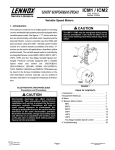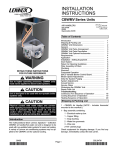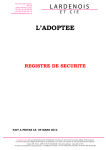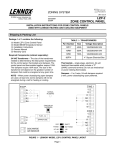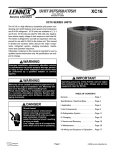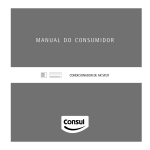Download Lennox International Inc. 21 User's Manual
Transcript
INSTALLATION/ SERVICE INSTRUCTIONS E2006 Lennox Industries Inc. Dallas, Texas, USA Humiditrol® Enhanced Dehumidification Accessory (EDA) Units ACCESSORIES 505,021M 02/06 Supersedes 01/06 RETAIN THESE INSTRUCTIONS FOR FUTURE REFERENCE Humiditrol® EDA Series Unit Signaturet Table of Contents Humiditrol® The Dave Lennox Collection Enhanced Dehumidification Accessory (EDA) is designed for installation with a Lennox R−410A split−system outdoor unit and an air handler or a furnace with a variable speed blower. This accessory is designed for indoor installations in either upflow or horizontal air discharge applications. This unit is for use only on R−410A systems with thermal expansion valves. Prior to installation, study the decision tree on page 16 to confirm that all application requirements for EDA installation are met. NOTE − For downflow application, refer to Installation Instruction Supplement, Installing EDA Unit in Downflow Configuration 505,134M. Shipping & Packing List S S 1 − Assembled EDA indoor unit 1 − Bag assembly (includes check/flow restrictor for use on EDA coil, EDA notification label). S 1 − Outdoor fan relay and wiring harness (used only with outdoor units equipped with variable speed fan motors) Check the components for shipping damage. If any damage is found, immediately contact the last carrier. Other Required Components Separately-ordered components are restricted to those listed in the Engineering Handbook and the price book: S SignatureStatt thermostat [Outdoor Sensor (46M98) included], − Single-stage (81M26) − Multi−stage (81M27) − Multi−stage heat-pump (81M28) S Twisted Pair Wire (84X49) for outdoor sensor to thermostat − Required for use with SignatureStatt. S 75VA 24VAC indoor unit transformer (12P61) − Required when EDA unit is installed with a two-stage heat pump system. S Humiditrol® EDA Insulation and Piping Kit (refer to applications information in Lennox Engineering Handbook) 02/06 *2P0206* Litho U.S.A. EDA Series Unit . . . . . . . . . . . . . . . . . . . . . . . . . . . . . . . Shipping & Packing List . . . . . . . . . . . . . . . . . . . . . . . . Other Required Components . . . . . . . . . . . . . . . . . . . . General Information . . . . . . . . . . . . . . . . . . . . . . . . . . . Unit Dimensions . . . . . . . . . . . . . . . . . . . . . . . . . . . . . . . Installation Dimensions and Arrangement . . . . . . . . . Component Functions . . . . . . . . . . . . . . . . . . . . . . . . . . General Installation Information . . . . . . . . . . . . . . . . . Electrical Wiring . . . . . . . . . . . . . . . . . . . . . . . . . . . . . . . EDA Installation Flow Chart & Procedures . . . . . . . . Leak Testing, Evacuation, Charging . . . . . . . . . . . . . . Insulating and Sealing the Unit . . . . . . . . . . . . . . . . . . Other System Components . . . . . . . . . . . . . . . . . . . . . How the EDA Unit Works . . . . . . . . . . . . . . . . . . . . . . . Cooling Mode with Dehumidification ON . . . . . . . . . . Cooling Mode (Dehumidification OFF) . . . . . . . . . . . . Heating Mode (Heat Pump Applications) . . . . . . . . . . Air Resistance Table . . . . . . . . . . . . . . . . . . . . . . . . . . . Repair Parts List . . . . . . . . . . . . . . . . . . . . . . . . . . . . . . Wiring Diagrams . . . . . . . . . . . . . . . . . . . . . . . . . . . . . . Decision Tree . . . . . . . . . . . . . . . . . . . . . . . . . . . . . . . . . 1 1 1 1 2 3 4 5 5 5 8 9 9 10 10 11 11 13 13 13 16 General Information NOTE − These instructions are intended as a general guide and do not supersede local codes in any way. Consult authorities having jurisdiction before installation. The Humiditrol® EDA unit will operate to dehumidify, as required, when ambient temperatures are below 95ºF. When temperatures reach 95ºF, the cooling and dehumidification requirements will both be satisfied by the increased system runtime. In applications that include a Humiditrol® EDA unit, a call to activate the dehumidification mode at or above 95ºF is unnecessary and would not be issued or allowed by the SignatureStatt room thermostat. Prior to system checkout, consider the outdoor ambient temperature. REMEMBER, the EDA unit does NOT function in temperatures at or above 95ºF. Plan testing to be conducted when temperatures are between 65ºF and 95ºF to ensure proper EDA set up and checkout operation. IMPORTANT The approved application for the EDA Series unit is restricted to those listed in the Engineering Handbook and price book. 505,021M *P505021M* WARNING WARNING This cased product contains fiberglass wool. Disturbing the insulation during installation, maintenance, or repair will expose you to fiberglass wool dust. Breathing this may cause lung cancer. (Fiberglass wool is known to the State of California to cause cancer.) Fiberglass wool may also cause respiratory, skin, and eye irritation. Risk of explosion or fire. Can cause injury or death. Recover all refrigerant to relieve pressure before opening the system. To reduce exposure to this substance or for further information, consult material safety data sheets available from address shown below, or contact your supervisor. IMPORTANT The Clean Air Act of 1990 bans the intentional venting of refrigerant (CFC’s, HFC’s, and HCFC’s) as of July 1, 1992. Approved methods of recovery, recycling or reclaiming must be followed. Fines and/or incarceration may be levied for noncompliance. Lennox Industries Inc. P.O. Box 799900 Dallas, TX 75379−9900 Unit Dimensions EDA Model Dimensions − Inches (mm) Dimension EDA−024B EDA−036C EDA−060D A 17−1/2 (445) 21 (533) 24−1/2 (622) B 12−1/4 (311) 12−1/4 (311) 14 (356) C 16−1/8 (422) 19−5/8 (498) 23−1/8 (587) D 16−1/8 (422) 19-5/8 (498) 23−1/8 (587) E 1−3/8 (35) 3−1/8 (79) 4−7/8 (124) F 3−1/8 (79) 4−7/8 (124) 6−5/8 (168) G 3 (76) 3−1/4 (83) 4−3/4 (121) Check/Flow Restrictor to Vapor Line Tee 11/16 (17) D 11/16 (17) 20−3/4 (527) To Charge Compensator side connection Electrical Inlet 22−1/4 (565) Liquid Line to Indoor TXV G E 1 (25) 9−1/2 (241) F B 2−1/2 (64) 1−3/4 (44) INLET AIR OPENING INLET AIR OPENING C 11/16 (17) EDA 01/06 11/16 (17) 11/16 (17) A Liquid Line From Outdoor Unit OUTLET AIR OPENING 11/16 (17) 1−7/16 (37) Page 2 20−1/8 (511) 11/16 (17) Installation Dimensions and Arrangement EDA−024B: 12−1/2 EDA−036C: 12−1/2 EDA−060D: 14 EDA UNIT (TRANSITION See Note 2) 12" (min.) Varies by indoor coil model; see LENNOX Engineering Handbook. INDOOR COIL Varies by air handler model; see LENNOX Engineering Handbook for dimensions. FURNACE TYPICAL UP−FLOW POSITION (Furnace Shown) TRANSITION (See Note 1) AIR FLOW 40 AIR FLOW UP-FLOW AIR HANDLER UP-FLOW FURNACE NOTES: 1. Transition is required for all air handlers; dimension width and depth is dependent upon the air handler and the EDA model used. 2. Transition is required between indoor coil and EDA if 5 ton EDA unit is used with small profile furnace. TYPICAL HORIZONTAL POSITION (Furnace Shown) Figure 1 Page 3 EDA INSTALLATION/ SERVICE INSTRUCTIONS Check/Flow Restrictor Operation Component Functions Charge CompensatorThe charge compensator (shown in figure 5) serves to maintain the proper amount of refrigerant circulating in larger systems. [Some systems do not require a charge compensator, but do require a similar kit to connect into the system (see Engineering Handbook)] FROM VAPOR LINE TEE FROM VAPOR LINE TEE The charge compensator stores excess refrigerant when the EDA coil is active and returns it to the system during normal cooling or heating operations. When the EDA coil is active, less charge is required to obtain the proper amount of subcooling because of the additional coil surface and the cooler air which passes over the EDA coil. CHECK/FLOW RESTRICTOR FLOATS IN CHATLEFF CONNECTOR GREATER PRESSURE O−RING SEALS CHECK/FLOW RESTRICTOR GREATER PRESSURE EDA UNIT EDA UNIT Figure 2 Valve AssemblyThe first valve of the diverting valve assembly (figure 3, E) directs the flow of refrigerant to either bypass the EDA coil (EDA coil is inactive) or pass through the EDA coil (EDA coil is active).The second valve (figure 3 F) directs the flow of refrigerant back to the liquid line when the first valve (E) allows flow through the EDA coil. When the EDA coil is inactive, the second valve (F) provides a vent path to the suction line, draining the EDA coil and charge compensator of liquid refrigerant. Check/Flow RestrictorThe check function of the check/flow restrictor (shown in figure 2) prevents refrigerant from flowing into the inactive components during times when the EDA coil is inactive. The flow restrictor controls the rate of return of charge to the system from the charge compensator and the EDA coil when the system changes from "EDA coil active" to "EDA coil inactive." EDA Unit Parts Arrangement A B EDA−024B C D A B EDA−036C C D A B EDA−060D C EDA COIL EDA COIL E F E F E F 3−WAY DIVERTING VALVE ASSEMBLY 3−WAY DIVERTING VALVE ASSEMBLY 3−WAY DIVERTING VALVE ASSEMBLY A − Liquid Line From Outdoor Unit B − Liquid Line to Indoor TXV C − Check/Flow Restrictor to Vapor Line Tee EDA COIL D − To Charge Compensator side connection (1/4" line must be brazed closed on systems that do not require the installation of a charge compensator) E − EDA inactive mode − bypasses the EDA EDA active mode − allows refrigerant flow through EDA F − EDA inactive mode − vent path to suction line; EDA active mode − directs refrigerant flow back to liquid line Figure 3 EDA 01/06 D Page 4 Releasing Air Charge General Installation Information NOTE − EDA units use dry air as a holding charge. WARNING CAUTION Improper installation, adjustment, alteration, service or maintenance can cause personal injury, loss of life, or damage to property. Installation and service must be performed by a qualified installer or service agency. The EDA coil is shipped from the factory pressurized with dry air. Pierce a hole in the coil’s rubber plug vapor line seal to relieve the pressure before removing the seals. The EDA unit may be used in upflow or horizontal discharge installations. Slots around the inlet end of the EDA cabinet are provided to secure the EDA unit to the duct flanges of indoor coil/air handler cabinets. Use field-provided #8 x 1" long SDST screw (usually 6 required). Ensure that the coil is void of pressure. Remove the rubber plug from the lines. NOTE − If there is no pressure when the plugs are pierced, check the unit for leaks before continuing with the installation. Refrigerant Line Connections NOTE − When connecting lines, be careful to avoid damaging the 3−way diverting valve access panel. Place a wet rag against the piping plate and around the EDA unit line connections. A wet rag heat shield must be in place during brazing to guard against damage to the paint. CAUTION Physical contact with metal edges and corners while applying excessive force or rapid motion can result in personal injury. Be aware of, and use caution when working nearby these areas during installation or while servicing this equipment. Electrical Wiring Refrigeration All EDA coils are shipped with a combination check/flow restrictor. The restrictor is provided in the bag assembly and must be installed. Refer to the appropriate high and/or low side installation instructions for information on the appropriate line sets. Refer to Lennox Refrigerant Piping guide (Corp. 9351−L9) for proper size, type, and application of field−fabricated lines. Electrical wiring diagrams are provided in figures 12 and 13 (see pages 14 and 15). Some modifications to certain units may be necessary. Review the diagrams before installation to ensure all necessary components are on hand at time of installation. EDA Installation and Checkout Flow Chart Follow the procedures in the flow chart in figure 4 while referring to the illustration in figure 5 to install the EDA: and associated components. Page 5 EDA INSTALLATION/ SERVICE INSTRUCTIONS EDA Installation & Checkout Flow Chart Required Parts (all applications) start ARE ALL REQUIRED PARTS AVAILABLE ? EDA Unit, with check/flow restrictor & label Appropriate SignatureStatt Thermostat 46M98 − Outdoor Sensor 84X49 − Twisted Pair Wire Appropriate Insulation and Piping Kit NO PROCURE MISSING PARTS Required Parts (2−Stage Heat Pump appl.) 12P61 − 75VA Transformer (for HP applications) YES Installation Process ENSURE ALL POWER IS OFF Check Dehumidification Operation MAKE WIRING CONNECTIONS AS SHOWN IN FIGURES 12 & 13 (SEE PAGES 14 AND 15) INSTALL EDA UNIT IN DUCT SYSTEM INSTALL EDA" LABEL ON OUTDOOR UNIT INSTALL THE CHARGE COMPENSATOR (IF REQUIRED) IN CONVENIENT LOCATION (SEE FIGURE 5) MAKE ALL REFRIGERATION CONNECTIONS, BEING SURE TO INSTALL THE CHECK/FLOW RESTRICTOR (SEE FIGURE 5) LEAK CHECK THE SYSTEM WITH 3−WAY VALVE ASSEMBLY SET TO EVACUATE" (SEE FIGURE 7) POWER UP THE INDOOR UNIT CHECK THAT 3−WAY VALVE ASSEMBLY IS SET TO COOLING" POSITION AS SHOWN IN FIGURE 7 ENABLE HUMIDITROL ON ROOM THERMOSTAT (SEE FIGURE 8) SET THERMOSTAT FOR MAXIMUM COOLING INSULATE ALL REFRIGERANT LINES OPEN REFRIGERANT VALVES EVACUATE THE SYSTEM AS DESCRIBED IN THE OUTDOOR UNIT INSTALLATION INSTRUCTIONS INSTALL OUTDOOR SENSOR TURN OUTDOOR UNIT MAIN POWER ON CHECK CHARGE AND CHARGE AS NEEDED (SEE PAGE 8) Figure 4 EDA 01/06 Page 6 SET COOLING SETPOINT ON ROOM THERMOSTAT TO 2 DEGREES ABOVE INDOOR TEMPERATURE (OUTDOOR UNIT WILL TURN OFF) NOTE − A Humiditrol® EDA−equipped system is allowed to operate and cool room temperature below set point (but only by 2ºF) when trying to satisfy a persisting humidity set point. SET DEHUMIDIFICATION SETPOINT TO 5% BELOW CURRENT ROOM RELATIVE HUMIDITY IS THE OUTDOOR TEMPERATURE BELOW 95ºF ? YES NO DEHUMIDIFICATION IS DE−ACTIVATED; CHECK FOR CORRECT OPERATION AT A TIME WHEN AMBIENT TEMPERATURE IS BELOW 95ºF. OUTDOOR UNIT: COMPRESSOR IN HIGH STAGE; FAN IN LOWEST SPEED; EDA: 3−WAY VALVE ASSEMBLY TO DEHUMIDIFICATION" POSITION INDOOR UNIT: FAN IN DEHUMIDIFICATION SPEED CHECK THE TEMPERATURE DIFFERENCE ACROSS THE EDA COIL AND THE LIQUID LINE TEMPERATURES AS NOTED IN FIGURE 9 ON PAGE 10 Typical Installation (Horizontal Air Handler shown) EDA UNIT Check/FlowRestrictor Details Electrical Inlet To Charge Compensator side connection (some applications) Check/Flow Restrictor to Vapor Line Tee TEFLON SEAL CHECK/FLOW RESTRICTOR AND O−RING FITTING IN EDA UNIT AIR FLOW IMPORTANT! RESTRICTOR MUST BE INSERTED WITH O−RING END OF RESTRICTOR TOWARD EDA UNIT FITTING. TORQUE CHATLEFF CONNECTION TO 20 FT. LBS. Liquid Line to Indoor TXV MUST BE INSULATED Liquid Line From Outdoor Unit TXV Liquid Line System without compensator INDOOR UNIT 1/4" PORT MUST BE BRAZED CLOSED air−flow Vapor Line EDA NO CHARGE COMPENSATOR OR 1/4" LINE OUTDOOR UNIT Liquid Line from Outdoor Unit Liquid Line to Indoor TXV Vapor Line MUST BE INSULATED ELECTRICAL INLET Liquid Line TO CHARGE COMPENSATOR SIDE CONNECTION Charge Compensator Details CHECK/FLOW RESTRICTOR TO VAPOR LINE TEE LIQUID LINE TO INDOOR TXV 2 ft. max. USE REDUCER(S) FROM CHARGE COMPENSATOR KIT (WHEN REQUIRED) VAPOR LINE FROM INDOOR COIL DROP TO CHARGE COMPENSATOR VAPOR LINE FROM OUTDOOR UNIT LIQUID LINE FROM OUTDOOR UNIT 7/8 X 7/8 X 3/8 TEE CHARGE COMPENSATOR 6 ft. max. BETWEEN CHARGE COMPENSATOR AND EDA USING 1/4" LINE PROVIDED IN CHARGE COMPENSATOR KIT TO CHECK/FLOW RESTRICTOR ON EDA USE REDUCER(S) FROM CHARGE COMPENSATOR KIT (WHEN REQUIRED) 1/4" TUBING CONNECTION − MUST BE AT LOWEST POINT OF THE COMPENSATOR TYPICAL HORIZONTAL POSITION INSTALLATION VAPOR LINE FROM INDOOR COIL CHARGE COMPENSATOR 1/4" TUBING CONNECTION − MUST BE ON BOTTOM OF COMPENSATOR USE REDUCER(S) FROM CHARGE COMPENSATOR KIT (WHEN REQUIRED) TO CHECK/FLOW RESTRICTOR ON EDA 7/8 X 7/8 X 3/8 TEE VAPOR LINE FROM OUTDOOR UNIT UPFLOW POSITION Figure 5 Page 7 EDA INSTALLATION/ SERVICE INSTRUCTIONS Leak Testing, Evacuating, Charging IMPORTANT Prior to starting the outdoor unit for charging, be sure the 3-way valve is energized and in the cooling" (forward) position (see figure 7). IMPORTANT The 3−way diverting valve actuator shaft setscrew (see figure 7) is factory set and is not to be adjusted. 3−way Diverting Valve Operation NOTE − During system operation, the 3-way valve requires 24-volt power to drive between cooling and dehumidification. The 3−way diverting valve is actually two valves connected by a common shaft, designed to open one valve while closing the other, and vice versa. For evacuating (with power off), the diverting valve can be REPOSITIONED using its actuator lever, a long setscrew that has been factory-set to a precise point on the common shaft. Do not loosen (unscrew) the setscrew. Should the setscrew become loose, carefully follow the note in figure 6 to position and tighten it. Re−aligning Setscrew NOTE − Actuator shaft setscrew is factory set and must not be adjusted. If the set screw should become loose, use a pliers to grip the shaft where shown (1) and rotate the shaft (in direction of the black arrow) until the pin stops (inset shows pin and stops). Press the red button (2) in the direction of the white arrow and move the lever (3) to the forward position and tighten setscrew to 60 in-lbs torque. 3. Very little charge is required for the additional volume of the EDA unit. When in normal cooling, the components will all be occupied by vapor that has very little weight. At most (depending on the model) an additional 1/4 pound of refrigerant may be required. 4. When shifting from dehumidify mode to cooling, or vice versa, wait at least 10 minutes for the system to reach stable operating pressure before checking temperatures and pressures, or adjusting refrigerant charge. NOTE − Prior to starting the outdoor unit for charging, set the thermostat to call for cooling (dehumidification OFF). It will take about 90 seconds for the 3−way diverting valve to energize and shift to the cooling position. To ensure that the 3-way diverting valve is energized and in the cooling" (forward) position, observe the position of the 3-way diverting valve actuator shaft setscrew in figure 7; if properly shifted, the setscrew will be in the forward position. Setting 3−Way Diverting Valve to Evacuate Position 1. PUSH RED TAB IN DIRECTION INDICATED. 2. PUSH ACTUATOR SHAFT DOWN TOWARD THE CENTER−OF−TRAVEL POSITION 2 1 1 3 2 STOP PIN SHAFT STOP COOLING (FORWARD) Figure 6 EVACUATE (CENTER) Leak Testing, Evacuating, Charging 1. Set the 3−way diverting valve actuator shaft to the center (evacuate) position for leak testing and evacuation (see figure 7). IMPORTANT! The actuator shaft must be set as described to allow the EDA to evacuate more quickly. 2. Refer to instructions provided with the outdoor unit for leak testing, evacuating and charging procedures. EDA 01/06 Page 8 DEHUMIDIFICATION (REARWARD) Figure 7 5. The charge must be checked with the system in cooling operation (dehumidification OFF). After testing and charging as required, set the thermostat to force a demand for dehumidification. Then, select HUMIDITROL mode from the DEHUMIDIFY menu (follow the path: MENU −> DEHUMIDIFY). The user control sequence is also shown in figure 8, C through H; specifically: Insulating and Sealing the Unit IMPORTANT S S All piping, metering devices, and connections must be insulated to prevent moisture damage caused by sweating. Seal the unit so that warm air is not allowed into the cabinet. This is especially important when the unit is installed in an unconditioned area. Make sure the liquid line entry points are sealed with either refrigerant tube insulating material or with Permagum (see figure 5 on page 7). Turn on Humiditrol − D & E Set level of dehumidification − F through H (adjustment range is from 45% to 60% and is factory set to 50%) If HUMIDITROL is enabled and the outdoor sensor is disconnected, operation is NOT allowed in dehumidification mode. This is indicated by the display of "OUTSIDE ERR" on the SignatureStatt thermostat Home screen. Setting Thermostat Other System Components Installer Setup Blower Control EDA units are to be applied with an indoor unit that has a variable speed motor (VSM). Refer to the indoor unit installation instruction for setting blower speed. INSTALLER SETTINGS Y AUTO CHANGEOVER ON EER ON DEADBAND 4.0°F HUMIDITROL OFF MAIN MENU Thermostat and Sensor A IMPORTANT HOME DISABLE ENABLE INSTALL MENU User Controls MAIN MENU PROGRAM HEAT / COOL HUMIDIFY DEHUMIDIFY A SignatureStatt thermostat and properlyconnected outdoor sensor is REQUIRED for the EDA unit to function properly. Twisted pair wire (84X49 or equivalent) is REQUIRED between the SignatureStat and the outdoor sensor. B SELECT HUMIDITROL ↓ SELECT DEHUMIDIFY MENU MODE OFF DEHUMIDIFY 50% MAIN MENU C Install the remote sensor on the outside of a northern wall of the home, away from direct sunlight or other heat sources that may affect its sensitivity. Refer to the SignatureStatt thermostat Installation Instructions for installation, wiring, and setup. Also refer to the SignatureStatt Thermostat Programming Guide for programming and settings. To configure the thermostat for operation with a Humiditrol® system, first enable HUMIDITROL in the thermostat’s installer settings (follow the path: MENU −> INSTALLER SETTINGS −> HUMIDITROL − see figure 8, A and B). Page 9 DEHUMIDIFY MENU MODE HUMIDITROL DEHUMIDIFY 50% SELECT MAIN MENU E DEHUM MENU SELECT SELECT F DEHUMIDIFY CONTROL 50 % SELECT D DEHUMIDIFY MODE OFF HUMIDITROL DEHUM MENU SELECT B ↑ ↓ DEHUMIDIFY MENU MODE HUMIDITROL DEHUMIDIFY 55% MAIN MENU G SELECT H Figure 8 EDA INSTALLATION/ SERVICE INSTRUCTIONS EDA Unit Operation Cooling Mode (Dehumidification ON) The EDA coil is added to an HVAC system downstream of the indoor coil. In dehumidification mode, the coil becomes an extension of the condenser coil and injects heat into the indoor air stream. This dehumidification mode allows significantly improved control of the humidity in the conditioned space without overcooling the space. The assembly includes a set of 3−way diverting valves which will either route refrigerant through the EDA coil, or cause the refrigerant to bypass the EDA coil, depending on the mode of operation. Operation Notes 1. IMPORTANT REMINDER! Dehumidification will not occur when the outside temperature is at or above 95ºF. 2. When operating in cooling (or heat pump heating) mode, all temperatures and pressures will be as in a normal system. 3. When the thermostat is in HUMIDITROL mode, and after a cooling demand has been satisfied but a dehumidification demand persists and the room temperature is not more than 2°F below the setpoint, the air handlers will operate at reduced airflow with the compressor at high speed. 4. When the unit is in the dehumidification mode, the display will show a raindrop" icon with an imbedded negative sign and the current relative humidity to its right. If the room thermostat’s cooling demand has been satisfied but the dehumidification setting has not been satisfied, the unit continues to run in dehumidification mode. The room thermostat sends a signal to the EDA unit’s 3−way diverting valve assembly to begin operating in the dehumidification mode. Figure 9 shows refrigerant flowing from the outdoor unit, entering the EDA, passing through the first 3−way diverting valve, then entering the EDA coil. There, heat from the warm refrigerant is transferred into the indoor air stream. The refrigerant exits the coil through the second 3−way diverting valve and into the indoor coil expansion valve. During dehumidification, the indoor air blower (and outdoor fan, if an outdoor relay is used) operates at a lower air volume. The cool, dehumidified air leaving the indoor coil is warmed as it passes over the EDA coil. Air temperature rise across the EDA coil can be from 10° to 25°F, depending on the operating ambient and air-conditioned space conditions. The warm vapor−liquid−refrigerant mixture entering the EDA unit from the outdoor unit will be subcooled in the EDA unit and enter the expansion valve at a lower-than-normal temperature. Liquid temperatures can be in the 65° to 70°F range, with a 10° to 40°F temperature change across the EDA. Cooling Cycle with EDA Coil Active (Model EDA−036C shown) VAPOR LINE VALVE 7/8 x 7/8 x 3/8 TEE CHARGE COMPENSATOR (holding some refrigerant) See note 3. OUTDOOR UNIT See note 1 See note 1 CHECK/FLOW RESTRICTOR (flow permitted) See note 2 See note 2 CHECK/ EXPANSION VALVE LIQUID LINE VALVE air flow INDOOR COIL 3−WAY DIVERTING VALVE INDOOR BLOWER INDOOR UNIT NOTE 1. With EDA Coil Active, expect a 10 to 25ºF air temperature rise across EDA coils. NOTE 2. With EDA Coil Active, expect a 10 to 40ºF liquid line temperature change across EDA coils. NOTE 3. Charge compensator and 1/4" line not required on all systems. See Engineering Handbook. Figure 9 EDA 01/06 Page 10 Cooling Mode (Dehumidification OFF) Figure 10 illustrates refrigerant flow in cooling mode (dehumidification mode OFF), The liquid refrigerant from the outdoor unit enters the EDA module . Since there is no demand for dehumidification, the 3−way diverting valve assembly directs the flow back out of the EDA module to the indoor unit expansion valve. Cooling Cycle with EDA Coil Inactive (Model EDA−036C shown) VAPOR LINE VALVE CHARGE COMPENSATOR (NOT holding refrigerant) See note 3. 7/8 x 7/8 x 3/8 TEE See note 1 See note 1 CHECK/FLOW RESTRICTOR (flow restricted) See note 2 See note 2 INDOOR BLOWER CHECK/ EXPANSION VALVE LIQUID LINE VALVE OUTDOOR UNIT air flow INDOOR COIL 3−WAY DIVERTING VALVE NOTE 1. In Cooling Mode, no air temperature change across EDA coils. INDOOR UNIT NOTE 2. In Cooling Mode, no liquid line temperature change across EDA coils. NOTE 3. Charge compensator and 1/4" line not required on all systems. See Engineering Handbook. Figure 10 Heating Mode (Heat Pump Applications) Figure 11 illustrates refrigerant flow in the heating mode. In heat pump application heating mode, a system that includes an EDA unit will operate as a conventional heat pump. The EDA unit does not operate in this mode. Heat Pump Heating Cycle with EDA Coil Inactive (Model EDA−036C shown) OUTDOOR UNIT CHARGE COMPENSATOR See note 3. 7/8 x 7/8 x 3/8 TEE See note 1 See note 1 CHECK/FLOW RESTRICTOR (flow restricted) See note 2 See note 2 air flow INDOOR COIL VAPOR LINE VALVE INDOOR BLOWER CHECK/ EXPANSION VALVE LIQUID LINE VALVE INDOOR UNIT NOTE 1. In Heating Mode, no air temperature change across EDA coils. NOTE 2. In Heating Mode, no liquid line temperature change across EDA coils. NOTE 3. Charge compensator and 1/4" line not required on all systems. See Engineering Handbook. Figure 11 Page 11 EDA INSTALLATION/ SERVICE INSTRUCTIONS Check List n Checkpoint What to Check Action Thermostat and Sensor Wiring Confirm Sensor connected to SignatureStatt using twisted pair wire (see wiring diagram figure 13) Thermostat Humiditrol® Installer Settings Confirm HUMIDITROL is enabled (see figure 8) Thermostat Humiditrol® User Settings Confirm HUMIDITROL − Dehumidify − ON is selected (see figure 8) Thermostat Humiditrol® User Settings Confirm Relative Humidity setting (see figure 8) Indoor Unit Variable-Speed Blower Settings Confirm Settings for D": CFM = 60% to 65% of 2nd-stage cool (see indoor unit installation instructions and table 1, below) Insulation Charge Compensator Insulation Liquid Line Insulation Vent Line to Suction Line Charge Compensator 1/4"Line Confirm 1/4" port oriented downward (see charge compensator details, figure 5) Check/Flow Restrictor 3/8" Line Confirm restrictor installed/oriented properly (see check/flow restrictor details figure 5) System Charge Refrigerant With unit running in cooling mode, check and confirm system is properly charged (see outdoor unit installation instructions). Outdoor Unit Fan Relay Confirm (if unit has variable speed outdoor fan) relay is installed properly (see wiring diagram figures 12 and 13) Outdoor Unit EDA Label Confirm label is installed in prominent location and will be easily visible during servicing. Confirm C fi iinsulation l ti iis properly l iinstalled t ll d ((see charge h compensator t kit instructions; also, see figure 5) NOTE − System will NOT operate in dehumidification mode with outdoor temperature at or above 95ºF. Operational Status Dehumidification Mode Record supply air temperature and confirm temperature that it is higher than in cooling mode. Operational Status Dehumidification Mode On units with variable speed outdoor fan, check that fan operates at approximately 250 rpm (lowest speed). Table 1 Demand Signals − Humiditrol® EDA Enabled Operating Sequence System Demand System Response Thermostat Demand System Type Step Y1 Y2 Relative Humidity Blower CFM (Cool) % G Status D ComCom pressor ON ON ON ON ON ON Acceptable Acceptable Acceptable 24 VAC 24 VAC 24 VAC High Low High 100 70 100 Compressor p and indoor blower follow bl f ll thermostat th t t demand ON ON ON ON ON ON Demand Demand Demand 24 VAC 24 VAC 24 VAC High Low High 100 70 100 Cooling g operation p has priority i it A Humiditrol® EDA− equipped system is allowed to operate and cool room temperature below set point (but only by 2 2ºF) F) when try trying to satisfy a persisting humidity set point; it is not allowed to operate at all when outdoor temperature is >95ºF. O Comments Cooling Operation − No call for dehumidification Single-stage outdoor unit Two-stage outdoor unit Y1 Two-stage outdoor unit Y2 1 1 2 ON ON ON (na) − ON Demand for Dehumidification and Cooling Single-stage outdoor unit Two-stage outdoor unit Y1 Two-stage outdoor unit Y2 1 1 2 ON ON ON (na) − ON Dehumidification Mode Only − No Cooling Demand Single-stage outdoor unit 1 ON (na) ON ON Demand 0 VAC High 50 − 70* Two-stage outdoor unit Y2 2 ON ON ON ON Demand 0 VAC High 50 − 70* * NOTE − Blower CFM speed (percentage) will vary depending on selected indoor equipment (furnace, coil blower, etc.). EDA 01/06 Page 12 Air Resistance Repair Parts Table 2 shows air volume and total air resistance for the available EDA models. Table 2 Air Resistance Model No. EDA−024B EDA−036C EDA−060DB S S S S S 3−way diverting valve assembly Check/flow restrictor EDA Relay Outdoor unit relay Teflon seals Wiring Diagrams Air Volume cfm L/s Total Air Resistance in. w.g. Pa 400 190 0.05 12 600 285 0.10 25 800 380 0.15 37 1000 470 0.22 55 Typical condensing unit and heat pump wiring diagrams are provided in figures 12 and 13. Some modifications to certain units may be necessary. Connect the EDA unit with the indoor and outdoor units, and to the thermostat. Be sure the outdoor sensor is installed and connected to the SignatureStatt thermostat’s outdoor sensor terminal block. Table 3 shows the requirements for control wiring. 600 285 0.05 12 Table 3 800 380 0.08 20 Control Wiring Requirements 1000 470 0.11 27 1200 565 0.15 37 1400 660 0.20 50 1000 470 0.05 12 1200 565 0.06 15 1400 660 0.08 20 1600 755 0.10 25 1800 850 0.11 27 2000 945 0.13 32 2200 1040 0.15 37 Units: System type 2 stage AC 1 stage AC 2 stage HP 1 stage HP (all) SignatureStatt to Sensor 2 (twisted pair) (with LSOM) (without LSOM) Indoor unit to: Humiditrol® EDA SignatureStatt Outdoor unit SignatureStatt Outdoor unit 9* 6 8* 4 8* 5 7* 3 10* 8 9* 7 9* 7 8* 6 3 *Includes conductor for 2−stage heat Page 13 EDA INSTALLATION/ SERVICE INSTRUCTIONS Typical EDA/Condensing Unit Wiring Diagram Red Black Black *OUTDOOR RELAY NOT REQUIRED WITH SINGLESPEED OUTDOOR FAN 5 2nd, rewire yellow wire as shown Violet Purple 7 1 VALVE ACTUATOR Orange Black RED K1 Yellow BLACK PURPLE Purple BLACK Yellow Blue B4 FAN 3 EDA Yellow 1st, cut yellow wire here. 5 2 Use Wirenuts SEE CONTROL WIRING BELOW FOR THERMOSTAT WIRING RED YELLOW DSY1 JUMPER − MUST BE REMOVED FOR HUMIDITROL OPERATION BLUE BLACK BROWN INDOOR UNIT Y1Y2 JUMPER − ONLY REMOVE IF 2−STAGE COOLING OUTDOOR WIRING (VSM APPLICATION ONLY) OUTDOOR UNIT INDOOR UNIT RED (NOT REQUIRED FOR APPLICATIONS WITHOUT LSOM) SignatureStatt THERMOSTAT OUTDOOR SENSOR (46M98) TWISTED PAIR RED PURPLE EDA UNIT BLACK PURPLE BLACK FAN RELAY (NOT REQUIRED WITH SINGLE-SPEED OUTDOOR FAN) YELLOW BLUE (NOT REQUIRED FOR SINGLE STAGE) BLACK BROWN (NOT REQUIRED FOR APPLICATIONS WITHOUT LSOM) Control Wiring Figure 12 EDA 01/06 Page 14 Y1Y2 JUMPER − IN FOR SINGLE− STAGE COOLING; REMOVED FOR 2−STAGE COOLING Typical EDA/Heat Pump Wiring Diagram Black Black *OUTDOOR RELAY NOT REQUIRED WITH SINGLESPEED OUTDOOR FAN 5 2nd, rewire yellow wire as shown Purple 7 1 VALVE ACTUATOR Orange Black RED K1 Yellow BLACK PURPLE Purple BLACK Yellow Blue B4 FAN Violet EDA Yellow 1st, cut yellow wire here. 3 5 2 Use Wirenuts INDOOR UNIT OUTDOOR WIRING (VSM APPLICATION ONLY) DSY1 JUMPER − MUST BE REMOVED FOR HUMIDITROL OPERATION BLUE BROWN SEE CONTROL WIRING BELOW FOR THERMOSTAT WONNECTIONS RO JUMPER − MUST BE REMOVED FOR HEAT PUMP APPLICATION BLUE OUTDOOR UNIT INDOOR UNIT RED FAN RELAY (NOT REQUIRED WITH SINGLE-SPEED OUTDOOR FAN) PURPLE RED BLACK EDA UNIT Y1Y2 JUMPER − ONLY REMOVE IF 2−STAGE COOLING SignatureStatt THERMOSTAT OUTDOOR SENSOR (46M98) TWISTED PAIR PURPLE BLACK YELLOW BLUE BROWN (NOT REQUIRED FOR APPLICATIONS WITHOUT LSOM) BLUE (NOT REQUIRED FOR SINGLE STAGE) Y1Y2 JUMPER − IN FOR SINGLE− STAGE COOLING; REMOVED FOR 2−STAGE COOLING Control Wiring Figure 13 Page 15 EDA INSTALLATION/ SERVICE INSTRUCTIONS Humiditrol® Enhanced Dehumidification Accessory (EDA) Decision Tree START Is dealer R−410A & EDA trained ? NO Obtain R−410A & EDA training YES Zoning application? NO Desired equipment NO matchup listed in EDA Engineering Handbook? YES YES Must use one of these outdoor units: XC21, XP19, XC13, XP13 ONLY! Must use one of these variable speed indoor units: CBX32MV, CBWMV, G60UHV, G60DFV, G61MPV ONLY! NOTE − Lennox warranties do not cover damage or defect resulting from operation with system components (indoor unit, outdoor unit, and refrigerant control devices) which do not match or meet the specifications recommended by Lennox. This unit intended to operate with variable speed air handlers − see Lennox Engineering Handbook for approved matches. (REFER TO EDA ENGINEERING HANDBOOK) X = PREFERRED MATCH−UP A = ALLOWED FOR PHYSICAL MATCH−UP TO EVAPORATOR HUMIDITROL® EDA CAPACITY −024B −036C −060D 94M41 94M42 94M43 −018 X A −024 X A −030 X A −036 X A −042 X −048 X −060 X Select Piping Kit (REFER TO EDA ENGINEERING HANDBOOK AND INSULATION & PIPING KIT INSTRUCTIONS 505,021M) CAPACITY OUTDOOR UNIT MODEL PIPING KIT −018 XC13 98M62 XP13 94M44 −024 XC13 98M62 XP13, XP19, XC21 94M44 −030 XC13, XP13 98M22 −036 XC13 98M22 XP13, XP19, XC21 94M44 −042 XC13 98M22 XP13 94M44 −048 XC13 98M22 XP13, XP19, XC21 94M44 −060 XC13 98M22 XP13, XP19, XC21 94M44 Upflow/horizontal NOTE − AIR HANDLER REQUIRES FIELD−FABRICATED TRANSITION BETWEEN BLOWER OUTLET AND EDA COIL. How installed ? Upflow/ Horizontal Downflow INSTALL SYSTEM Figure 14 EDA 01/06 MUST BE TXV ONLY Must be valid ARI rated match (refer to outdoor unit Engineering Handbook) Select EDA Application Not Approved DO NOT INSTALL [If furnace] Select indoor coil Page 16 Downflow NOTE − REQUIRES ADDITIONAL FIELD−FABRICATED SUPPORT FRAME & TRANSITION; SEE INSTALLATION SUPPLEMENT 505,134M



















